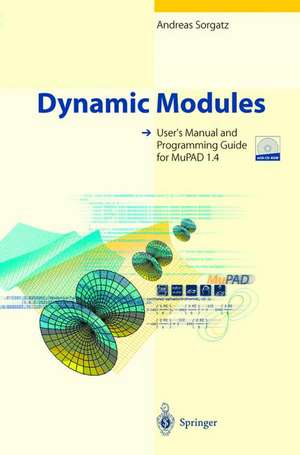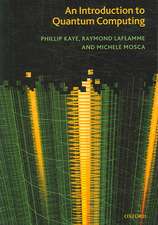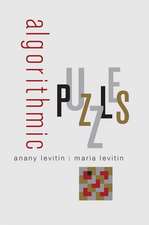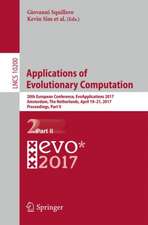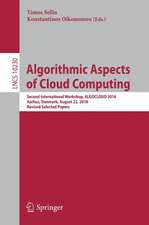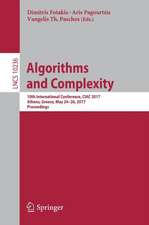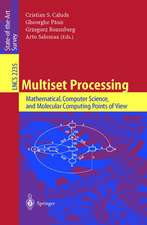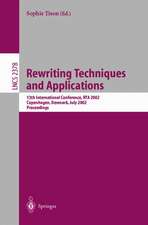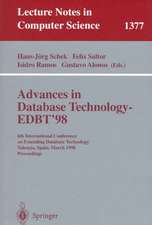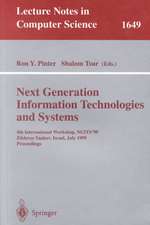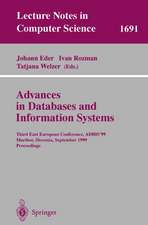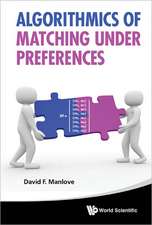Dynamic Modules: User’s Manual and Programming Guide for MuPAD 1.4
Autor Andreas Sorgatzen Limba Engleză Paperback – 20 oct 1998
This book is addressed to users and developers of dynamic modules in MuPAD.
The accompanying CD-ROM includes a hypertext version of the manual and a trial version of MuPAD 1.4.1 for Linux and Solaris 2.5.
Preț: 331.91 lei
Preț vechi: 414.89 lei
-20% Nou
Puncte Express: 498
Preț estimativ în valută:
63.52€ • 68.97$ • 53.36£
63.52€ • 68.97$ • 53.36£
Carte tipărită la comandă
Livrare economică 23 aprilie-07 mai
Preluare comenzi: 021 569.72.76
Specificații
ISBN-13: 9783540650430
ISBN-10: 3540650431
Pagini: 264
Ilustrații: XXIV, 235 p. With online files/update.
Dimensiuni: 155 x 235 x 14 mm
Greutate: 0.4 kg
Ediția:Softcover reprint of the original 1st ed. 1999
Editura: Springer Berlin, Heidelberg
Colecția Springer
Locul publicării:Berlin, Heidelberg, Germany
ISBN-10: 3540650431
Pagini: 264
Ilustrații: XXIV, 235 p. With online files/update.
Dimensiuni: 155 x 235 x 14 mm
Greutate: 0.4 kg
Ediția:Softcover reprint of the original 1st ed. 1999
Editura: Springer Berlin, Heidelberg
Colecția Springer
Locul publicării:Berlin, Heidelberg, Germany
Public țintă
Professional/practitionerCuprins
1 Introduction and Quick Start.- 1.1 How to Read this Manual.- 1.2 The Concept in Brief.- 1.3 Where to Find Further Information.- 1.4 Challenges and Contributions.- 2 Modules User Interface.- 2.1 Basic Functions to Access Modules.- 2.2 Extended Module Management.- 2.3 Module Domain Representation.- 2.4 Module Online Documentation.- 3 Introduction to Module Programming.- 3.1 Module Source Code.- 3.2 Creating Binary Code.- 3.3 Predefined Methods and Reserved Names.- 3.4 Online Documentation File Format.- 4 Inside MuPAD.- 4.1 System Components.- 4.2 The Kernel.- 4.3 The Interpreter.- 4.4 Memory Management System.- 4.5 Data Types.- 4.6 Displaying MuPAD Objects.- 4.7 Module Management System.- 5 Module Generator.- 5.1 Analysis and Code Extension.- 5.2 Creating Executable Modules.- 5.3 Module Debugging.- 5.4 Module Generator Options.- 5.5 Warning and Error Messages.- 6 Application Programming Interface (MAPI).- 6.1 Introduction and Conventions.- 6.2 Defining Module Functions.- 6.3 Type Checking.- 6.4 Comparing Objects.- 6.5 Data Conversion.- 6.6 Basic Object Manipulation.- 6.7 Constructing MuPAD Objects.- 6.8 MuPAD Interpreter Interface.- 6.9 Arbitrary Precision Arithmetic.- 6.10 Miscellaneous.- 7 Special features.- 7.1 Module Initialization Function.- 7.2 Including MuPAD Code.- 7.3 Storing a Global State.- 7.4 User-defined Data Types.- 7.5 MuPAD Preferences.- 8 Technical Information.- 8.1 Supported Operating Systems.- 8.2 Integrating Software Packages.- 8.3 Position Independent Code.- 8.4 Including Non C++ Code.- 8.5 Shared Libraries.- 8.6 Analyzing Module Object Code.- 8.7 Debugging Dynamic Modules.- 9 Trouble Shooting.- 9.1 Naming Conflicts.- 9.2 Exceptions and Threads.- 9.3 Streams and Templates.- 9.4 Signals.- 9.5 Questions and Answers.- 10 Demos and Applications.- 10.1Some Introducing Examples.- 10.2 User-defined Data Types.- 10.3 Numerics.- 10.4 Arbitrary Precision Arithmetic.- 10.5 Polynomial Computations.- 10.6 Interprocess Communication Protocols.- 10.7 Miscellaneous.- A The Accompanying CD-ROM.- A.1 Contents of the CD-ROM.- A.1.1 MuPAD.- A.1.2 ASAP.- A.1.3 GB and RealSolving.- A.1.4 GMP.- A.1.5 MAGNUM.- A.1.6 MP.- A.1.7 NTL.- A.1.8 PVM.- A.1.9 Singular.- A.2 System Requirements.- A.3 Installation.- A.3.1 Using the CD-ROM Live System.- A.3.2 Installation on Hard Disk.- A.4 MuPAD License Agreements.- A.4.1 General License.- A.4.2 Educational License.- A.4.3 How to Register MuPAD.- B Changes.- B.1 With Respect to Release 1.2.2.- B.2 With Respect to Release 1.3.0.- B.3 Latest News and Changes.- C mmg Short Reference.- D MAPI Short Reference.- E Glossary.
Textul de pe ultima copertă
A dynamic module is a special kind of machine code library that can be loaded at run-time like MuPAD library packages. Dynamic modules allow users to integrate simple C/C++ functions as well as complete software packages into MuPAD and to use them as regular MuPAD functions. They give users direct access to internal methods and data structures of MuPAD and allow it to be extended with almost any desired feature. Programming and creating dynamic modules is facilitated by the MuPAD Application Programming Interface MAPI and a special generator.
This book is addressed to users and developers of dynamic modules in MuPAD.
The accompanying CD-ROM includes a hypertext version of the manual and a trial version of MuPAD 1.4.1 for Linux and Solaris 2.5.
This book is addressed to users and developers of dynamic modules in MuPAD.
The accompanying CD-ROM includes a hypertext version of the manual and a trial version of MuPAD 1.4.1 for Linux and Solaris 2.5.
Caracteristici
A very flexible and efficient way to integrate C/C++ functions as well as complete software packages into MuPAD. Enables users to add compiled C/C++ code to MuPAD at runtime with the advantage of direct access to internal MuPAD C/C++ routines. CD-ROM includes a hypertext version of the manual and a trial version of MuPAD 1.4.1 for Linux 2.0 and Solaris 2.5.
